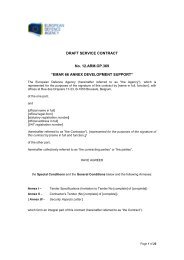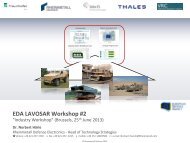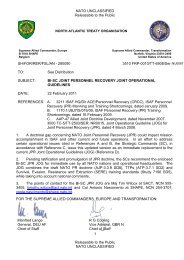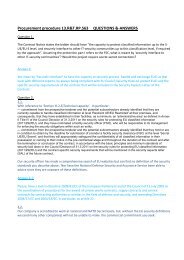capability development plan - European Defence Agency - Europa
capability development plan - European Defence Agency - Europa
capability development plan - European Defence Agency - Europa
Create successful ePaper yourself
Turn your PDF publications into a flip-book with our unique Google optimized e-Paper software.
AN INITIAL LONG-TERM VISION<br />
FOR EUROPEAN DEFENCE CAPABILITY AND<br />
CAPACITY NEEDS<br />
12. Even as Europe becomes more dependent on the wider world, and the immediate neighbourhood<br />
becomes more problematic, so it may become more cautious about military intervention. The “CNN<br />
effect” and associated casualty aversion are already familiar. Military operations will be subject to everincreasing<br />
scrutiny by elected officials, media and populations. Governments and societies increasingly<br />
concerned for internal security and social cohesion may be even more hesitant to undertake potentially<br />
controversial interventions abroad - in particular interventions in regions from where large numbers of<br />
immigrants have come. Continued proliferation of nuclear, biological and chemical capabilities may<br />
also be expected, complicating the calculus of interventions.<br />
13. Caution may be reinforced by increased concern with the legality of military action, as globalisation<br />
disseminates the concept of international law. Military action, not explicitly authorised by the UN may<br />
become increasingly controversial. In the conduct of war, ever greater attention will be paid to<br />
proportion and justification in the application of force, with an increasing tendency to hold individuals<br />
responsible for their actions not just at head of state or military commander level but down the<br />
command chain. Attention to collateral damage will be ever more acute.<br />
14. Increasing concern with homeland security will erode distinctions between what is regarded as the<br />
province of “defence” and what of “security”, and indeed may call in question the taxpayer’s willingness<br />
to fund “defence” if this is seen as wholly concerned with interventions abroad or deterring increasingly<br />
improbable conventional attacks on <strong>European</strong> territory.<br />
15. Europe will remain one of the most prosperous and stable regions on the <strong>plan</strong>. But, as it ages,<br />
loses economic pre-eminence and becomes more anxious about its security, it may also find the<br />
problems on its periphery increasingly challenging.<br />
CHALLENGES FOR DEFENCE<br />
16. Against this background: what are the principal challenges for defence Apart from the danger,<br />
noted above, of “defence” becoming perceived as peripheral to the primary security concerns of<br />
<strong>European</strong> citizens, we identify two key issues:<br />
• Adapting to the changing role of force<br />
• Adapting to the technological revolution<br />
ADAPTING TO THE CHANGING ROLE OF FORCE<br />
17. It is a familiar thought that war is the continuation of politics by other means. But we have become<br />
used to these activities being conducted in distinct phases. When the politicians and diplomats fail,<br />
they hand matters over to the military, re-entering to settle the peace when the military issue is<br />
decided. Twice in the 20th century war took over from politics for a period of years. Similarly,<br />
expeditionary operations traditionally involved dispatching the force commander with the broadest of<br />
objectives and the freest of hands, requiring him only to report success when the job was done.<br />
18. The all-seeing eye of the camera and the speed of modern communication have changed all that.<br />
All parties in modern conflicts realise that the political outcome will be determined not just by the<br />
achievement of military objectives, but by the manner in which operations are conducted or are<br />
perceived to be conducted. There seems always to be a video camera at hand, and a TV station ready<br />
to broadcast what it sees to global audiences. And the operation itself will be impacted by reactions of<br />
local actors and onlookers to breaking news (or rumours), even from the other side of the world.<br />
19. The interplay between the political, the military and the mediatic is now continuous; and military<br />
success achieved in the wrong way can mean political failure.<br />
20. With this 24/7 scrutiny has come, as noted above, an ever-increasing premium on issues of<br />
legitimacy and conformity with international law – a not always precise but certainly expanding corpus<br />
of constraining standards. This may include the interpretation of the Right of Self-<strong>Defence</strong> and the<br />
Threat to International Peace and Security as stipulated in the UN Charter (Jus ad Bellum), and the<br />
future balance between Intervention and State Sovereignty. The way force is employed is increasingly<br />
constrained by legal and policy considerations based on general international law and the law of<br />
armed conflict when applicable. It is likely that policy could become increasingly restrictive about the<br />
conditions in which military force is deemed legitimate. In addition, international criminal law comes<br />
into play with the establishment of the International Criminal Court and a variety of ad hoc jurisdictions.<br />
All these <strong>development</strong>s will create an increasing level of complexity for the political and military<br />
operators and <strong>plan</strong>ners.<br />
21. Allied to this is the widespread perception that technology is putting into military hands the means<br />
to conduct operations with ever greater precision and restraint. Warfare has been described as a<br />
mixture of intelligence and kinetic energy. The opening campaigns in Afghanistan and Iraq have<br />
confirmed beyond doubt that we are transitioning from the industrial age to the information age of war<br />
– that intelligence (or knowledge, or information) will become an ever more important resource for<br />
successful operations, whilst kinetic energy has to be applied in ever more precise and limited<br />
quantities.<br />
21<br />
FUTURE TRENDS FROM THE CAPABILITY DEVELOPMENT PLAN

















